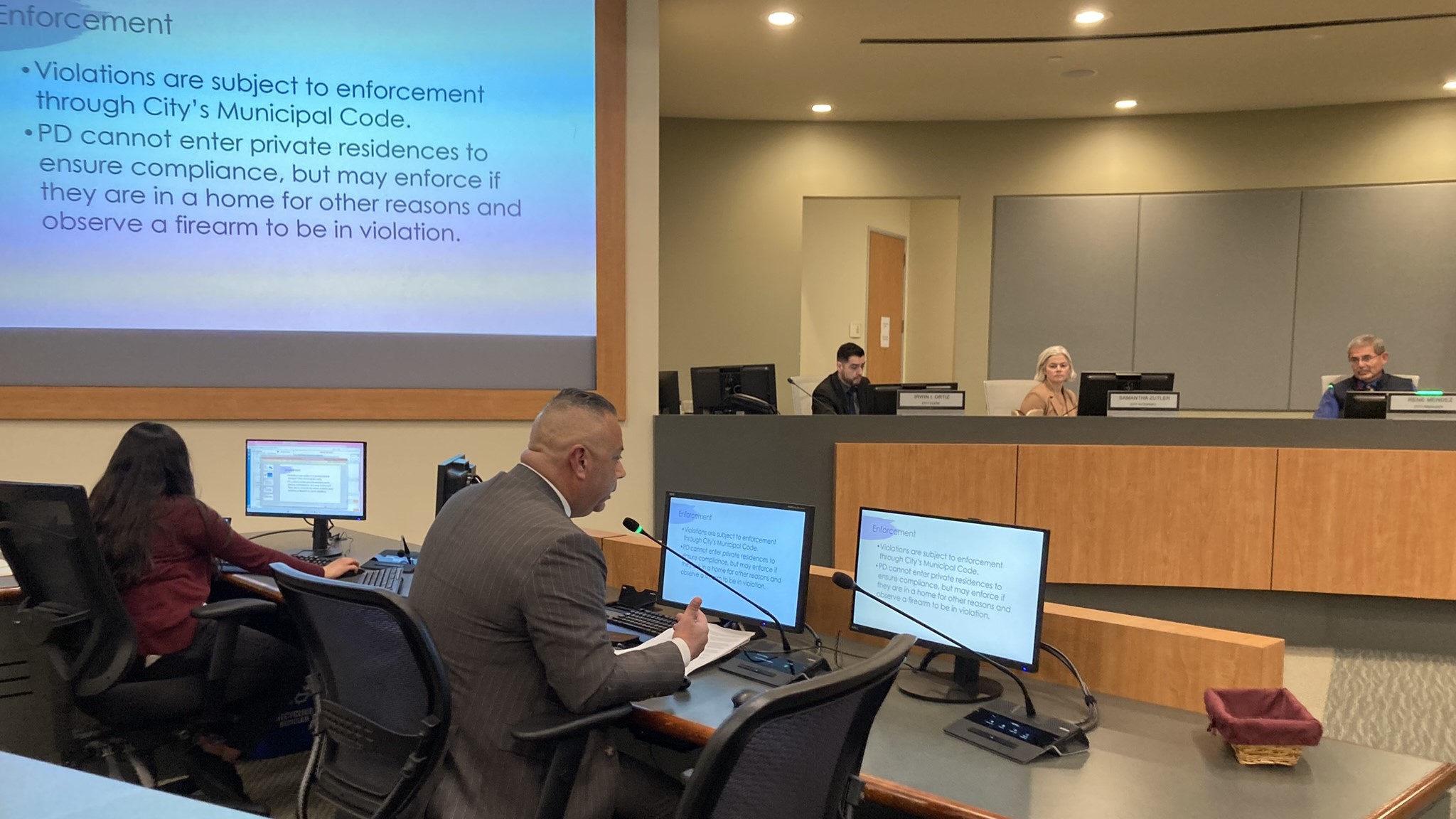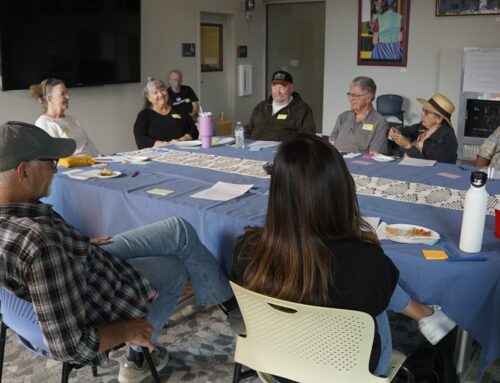
Watsonville Police Chief Jorge Zamora, in a gray suit, speaks during a Watsonville City Council meeting on Tuesday. (Jesse Kathan — Santa Cruz Local)
WATSONVILLE >> The Watsonville City Council on Tuesday approved $200,000 for a new homelessness outreach program.
- Separately, Watsonville police plan to add a new police service specialist to write tickets to illegally parked cars and RVs.
- The council also advanced a proposal that would require guns be stored in a locked container or disabled with a trigger lock.
Read Santa Cruz Local's Election Guide
Homelessness response
The six-month pilot program for homelessness response includes:
- A new non-officer police employee to conduct outreach with unhoused people and connect them to resources.
- A contract with a nonprofit to provide staff to assist the police employee. The city has not yet chosen a nonprofit, but is considering groups including Community Action Board and Free Guide.
- More funding for trash cleanups on streets and other areas.
The pilot program is part of a larger homelessness response plan, said Watsonville City Manager René Mendez. City staff are expected to provide more details on the program at a March 23 special meeting.
The city manager’s office requested the money as part of the city’s mid-year budget adjustments. Part of the money is expected to pay for a new part-time police service specialist, which is a non-officer employee that typically assists police with traffic control and other non-emergency tasks. The department now has one such position, Watsonville Police Chief Jorge Zamora said at Tuesday’s meeting.
The police service specialist is expected to work alongside nonprofit homeless outreach workers. The county may pay for some of these staff through an existing county contract, Mendez wrote in an email.
The program aims to reduce the workload of police and its Crisis Assessment Response and Engagement Team. The team includes two police officers and a county mental health clinician. The team is frequently deployed to assist unhoused people, Zamora said. “That’s not their focus. Their main focus is mental health,” he said.
Watsonville City Councilmember Jimmy Dutra said was unsure about giving part of the money to a nonprofit and approving the program without complete details. Homelessness response should focus on public safety, he said. He said female business owners have called him concerned about their own safety.
“When a homeless man goes into their bathroom and locks themselves in there, they call the cops and no one’s showing up,” Dutra said. He added that sending a non-police officer to work with unhoused people may not be safe.
“Are they going to be trained to deal with the situation if a person is mentally ill or comes out with like, a gun or a knife?” Dutra asked.
Zamora said the police service specialists are trained to identify unsafe situations and call for a police officer if needed.
“They’re being trained by police officers on how to protect themselves,” Zamora said. Homeless people often don’t trust police officers, he said. “Other agencies have tried and failed sending a police officer — officer friendly — to go deal with this,” he said. “It just doesn’t work.”
Councilmember Eduardo Montesino said he supported funding the plan, even without the full details. “We cannot wait,” he said. “We need to try something because what we’re doing, it’s currently not working.”
Dutra agreed to fund the program. “I do understand how we are in a desperate position right now,” he said.
The council voted 7-0 to approve the mid-year budget adjustments, including the money for the pilot program.
Illegal parking
Separate from the homeless program, Watsonville police plan to convert one vacant police officer position to a new police service specialist focused on issuing citations to illegally parked cars and RVs, and responding to car crashes without injuries.
The department has nine vacant police officer positions, Zamora said. “The majority of the people who are leaving are leaving because they can make more money somewhere else,” he said. “We can’t compete with Santa Clara. We can’t compete with San Jose or all these other agencies.” A new police service specialist would allow officers to more quickly respond to other calls, he said.
Councilmember Ari Parker said filling the vacancies is important for addressing crime from unhoused people. “There’s a criminal element that is coming in with our homeless, which is victimizing [other] homeless folks, as well as our surrounding businesses and our downtown,” she said. Parker said the city’s economic development isn’t possible “without making this a law and order city, and we can’t do that without a police force being fully staffed.”
Some members of MILPA Collective, a nonprofit that advocates for criminal justice reform, lauded the new homelessness outreach pilot project. MILPA stands for Motivating Individual Leadership for Public Advancement.
Bernie Gomez, a community advisor for MILPA, said he objected to councilmembers’ descriptions of homeless people and Parker’s call for a “law and order” city.
“You’re demonizing them, you know, you’re making them seem like they’re like these animals,” Gomez said.
Gun storage law
The council approved a new gun storage law aimed at curbing gun violence. The law requires that guns be stored in a locked container or disabled with a trigger lock approved by the California Department of Justice. Free trigger locks are available at Watsonville police stations, said Zamora, the police chief.
Several other cities including Santa Cruz have similar laws. In Santa Cruz, a law that requires locked firearm storage was adopted in 2015. No one has been charged with violating the law since 2016, said Santa Cruz Police Sgt. Jon Bush. The Santa Cruz Police Department does not have relevant records prior to 2016, he said.
State law requires guns to be stored in a locked container or disabled with a trigger lock only if children live in the house or someone who cannot legally own guns can access them. A proposed state law, SB 53, would extend the locked storage requirement to all gun owners.
The Watsonville law also requires stolen guns to be reported to the city within 48 hours. State law gives five days to report stolen guns.
Watsonville police would likely enforce the law if officers are already in someone’s home for another reason, Zamora said. Police would issue a ticket if they see an unsecured gun. The department hasn’t settled on a fine amount, he said. “The goal here is not to make money off of this, but to educate folks,” he said.
Dutra said he proposed the law in an effort to stop youth gun violence and suicide. “We’re living in a time where we’re seeing young people have a bad day, they get a hold of their parents’ gun, they make decisions that could affect their lives forever,” he said. “This is something very simple that could save even one life.”
The council voted 7-0 to adopt the first reading of the law. A second reading for final approval has not yet been scheduled.
Questions or comments? Email [email protected]. Santa Cruz Local is supported by members, major donors, sponsors and grants for the general support of our newsroom. Our news judgments are made independently and not on the basis of donor support. Learn more about Santa Cruz Local and how we are funded.
Jesse Kathan is a staff reporter for Santa Cruz Local through the California Local News Fellowship. They hold a master's degree in science communications from UC Santa Cruz.





